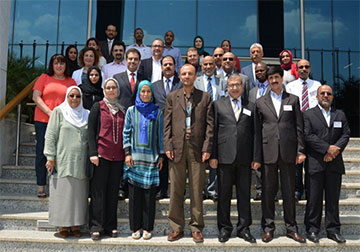 Click on image to enlarge 28 Aug 2016 | Cairo – Representatives from Member States met in Cairo recently to review and discuss the results of the assessment on country capacity to report on the 68 core health indicators; discuss key public health challenges in reporting on the core health indicators and needed technical resources to improve quality and reporting. The representatives also discussed opportunities and action steps to strengthen data sources in order to enhance country capacities to report on the core health indicators. The outcome of the workshop will also help countries in the Region to plan for the collection and reporting of the Sustainable Development Goal (SDG) indicators on health. The inter-country workshop was inaugurated by Dr Ala Alwan, WHO Regional Director for the Eastern Mediterranean and Chaired by Dr Arash Rashidian, Director, Information, Evidence and Research.
Click on image to enlarge 28 Aug 2016 | Cairo – Representatives from Member States met in Cairo recently to review and discuss the results of the assessment on country capacity to report on the 68 core health indicators; discuss key public health challenges in reporting on the core health indicators and needed technical resources to improve quality and reporting. The representatives also discussed opportunities and action steps to strengthen data sources in order to enhance country capacities to report on the core health indicators. The outcome of the workshop will also help countries in the Region to plan for the collection and reporting of the Sustainable Development Goal (SDG) indicators on health. The inter-country workshop was inaugurated by Dr Ala Alwan, WHO Regional Director for the Eastern Mediterranean and Chaired by Dr Arash Rashidian, Director, Information, Evidence and Research.
"The inter-country workshop is an important milestone to strengthen health information systems in the Region; and WHO is working with the Ministry of Health and other sectors to implement the framework for health information systems and improve civil registration and vital statistics (CRVS) systems", said Dr Alwan in his opening remarks. Referring to efforts made by WHO and the Member States in strengthening health information and CRVS systems, he noted that "The Region has demonstrated commitment and political support by endorsing the framework for health information systems. Countries should strengthen their efforts to report reliably on the 68 core health indicators and be confident in reporting on the SDGs."
Participants reviewed and discussed the assessment results on country capacity to report on the core indicators; and also discussed the data sources for the core indicators and the health-related SDG indicators. In working groups, participants discussed key challenges and solutions or innovative approaches to ensure that countries have functional health information systems, are able to conduct population-based surveys, improve reporting of the core indicators that are estimated, and report on the SDG indicators that are not part of the core health indicators. A number of follow-up activities were recommended in order to improve the capacity to report on the core indicators and the health-related SDG indicators.
Participants included representatives from 16 Member States in the Eastern Mediterranean and staff from WHO Regional Office.





